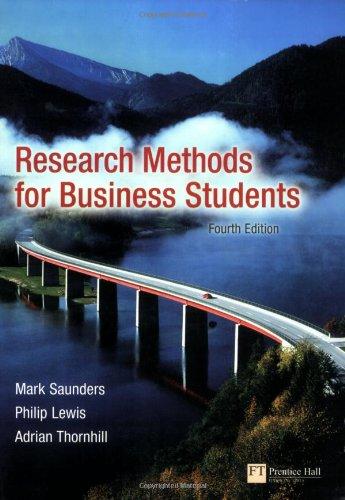Question
Part I: Based on the provided information, it seems that the CEO of Gregory's Consulting displayed the leadersh Previous assignment: 1. Preferred Interviewer: CEO Reason:
Part I:
Based on the provided information, it seems that the CEO of Gregory's Consulting displayed the leadersh
Previous assignment:
1. Preferred Interviewer: CEO
- Reason: The CEO demonstrated a leadership style characterized by being pleasant, genuine, thoughtful, and enthusiastic. This approach is appealing because it fosters a positive and supportive work environment. The CEO's emphasis on ensuring every employee has what they need to succeed indicates a strong commitment to employee well-being and growth. This aligns with the idea of servant leadership, where leaders prioritize the needs of their team members
2. Preferred Leadership Style, Role, and Traits:
- Leadership Style: Servant Leadership
Explanation: This leadership style emphasizes serving and supporting the needs of the team, rather than solely focusing on hierarchical authority. It promotes a culture of collaboration, empathy, and empowerment.
- Role: Facilitator and Supporter
Explanation: The CEO's role as a facilitator ensures that employees have the resources, guidance, and support necessary for success. By actively working to remove obstacles and provide necessary tools, the CEO enables employees to perform at their best.
- Traits: Pleasant, Genuine, Thoughtful, Enthusiastic
Explanation: These traits contribute to a positive and motivating work environment. Being pleasant and genuine fosters trust and open communication, while thoughtfulness and enthusiasm inspire a sense of purpose and engagement.
Part II:
1. Company with Routine and Unskilled Job Functions:
- Leadership Style: Transactional Leadership
- Role: Organizer and Enforcer
- Traits: Organized, Detail-Oriented, Disciplined
Explanation: In a company with routine and unskilled job functions, a transactional leadership style is effective. This style provides clear expectations, rewards performance, and enforces standards. The leader should be organized to establish efficient processes and detail-oriented to ensure tasks are completed accurately.
2. Company with Dangerous Job Functions (Toxic Waste Handling or Heavy Equipment Operation):
- Leadership Style: Transformational Leadership
- Role: Safety Champion and Mentor
- Traits: Safety-Conscious, Inspiring, Experienced
Explanation: In a company dealing with dangerous job functions, transformational leadership is crucial. This style inspires employees to transcend their current capabilities, especially in terms of safety awareness and adherence to protocols. The leader should be highly safety-conscious, experienced in risk management, and capable of motivating employees to prioritize safety.
3. Company Preparing to Disrupt an Existing Market with Ground-Breaking Technology:
- Leadership Style: Visionary Leadership
- Role: Innovator and Strategist
- Traits: Visionary, Creative, Strategic Thinker
Explanation: Disrupting an existing market requires a leader who can envision new possibilities and guide the organization through innovation. The leader should be visionary, capable of thinking outside the box, and strategic in developing a roadmap for market disruption.
4. Company Preparing for an IPO:
- Leadership Style: Strategic Leadership
- Role: Financial Steward and Communicator
- Traits: Analytical, Transparent, Communicative
Explanation: In preparation for an IPO, the leader must focus on financial stability, transparency, and effective communication. A strategic leader should be skilled in financial analysis, transparent in reporting, and capable of communicating the company's value proposition to potential investors.
Incorporate your initial discussion response into this assignment and discuss the following:
- Explain whether the strategies identified in your initial discussion were used constructively to enhance organizational goal attainment. Discuss whether these strategies were used for self-serving purposes.
- Discuss whether you have power relative to this person. Why or why not? Do you need or want more power in this case? If yes, then what are some of the ways in which you might increase your influence and power?
- Describe what you can learn from this person that will help you gain power and use it constructively for your and the organization's benefit. (In some cases, this might involve learning from behavior and strategies you want to avoid rather than emulate).
Step by Step Solution
There are 3 Steps involved in it
Step: 1

Get Instant Access to Expert-Tailored Solutions
See step-by-step solutions with expert insights and AI powered tools for academic success
Step: 2

Step: 3

Ace Your Homework with AI
Get the answers you need in no time with our AI-driven, step-by-step assistance
Get Started


